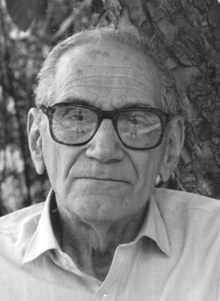Hans Wallach
| Hans Wallach | |
|---|---|
 |
|
| Born |
November 28, 1904 Berlin |
| Died | February 5, 1998 (aged 93) Media, Pennsylvania |
| Awards | Member of National Academy of Sciences, APA Distinguished Contribution Award, Howard Crosby Warren Medal |
| Academic background | |
| School or tradition | Gestalt psychology |
| Academic work | |
| Main interests | visual and auditory perception, perceptual adaptation |
| Notable ideas | Precedence effect (audition), Kinetic depth effect (vision) |
Hans Wallach (November 28, 1904 – February 5, 1998) was a German-American experimental psychologist whose research focused on perception and learning. Although he was trained in the Gestalt psychology tradition, much of his later work explored the adaptability of perceptual systems based on the perceiver’s experience, whereas most Gestalt theorists emphasized inherent qualities of stimuli and downplayed the role of experience. Wallach’s studies of achromatic surface color laid the groundwork for subsequent theories of lightness constancy, and his work on sound localization elucidated the perceptual processing that underlies stereophonic sound. He was a member of the National Academy of Sciences, a Guggenheim Fellow, and recipient of the Howard Crosby Warren Medal of the Society of Experimental Psychologists.
Wallach was born in Berlin on November 28, 1904, to a Jewish family. Following early studies in chemistry, he enrolled at the Berlin Psychological Institute, serving first as assistant to its director, Wolfgang Köhler, and subsequently conducting research of his own. He completed the work for a PhD degree in 1934, hurrying because his vulnerable position as a Jew in Nazi Germany had led him to decide on emigration. Jewish professors were being dismissed from universities. Wallach considered himself poorly prepared when he took his oral exams, relating later, "I shall never forget the kindness of [two professors] who, aware of my precarious situation, allowed me to pass.".
Köhler, who was not Jewish but who strongly resisted the growing Nazi influence, had decided to emigrate as well. In 1935 he was offered a position at Swarthmore College, in Pennsylvania. The following year he invited Wallach to join him as a research associate. Wallach worked at Swarthmore for the rest of his career. For the first six years he did not teach but only conducted research, but in 1942 the demands of the war effort depleted the psychology department faculty, and Wallach (who was ineligible for military service) was appointed as an instructor. He rose through academic ranks, becoming a full professor in 1953, and chair of the psychology department from 1957 to 1966. In 1971 he was designated Centennial Professor of Psychology. He retired from teaching in 1975, but remained active in research until 1994.
In addition to his work at Swarthmore, Wallach was a visiting professor at the New School for Social Research in New York from 1947 to 1957. In 1948 he held a Guggenheim Fellowship, and in 1954–55 he was a member of the Institute for Advanced Study at Princeton.
...
Wikipedia
